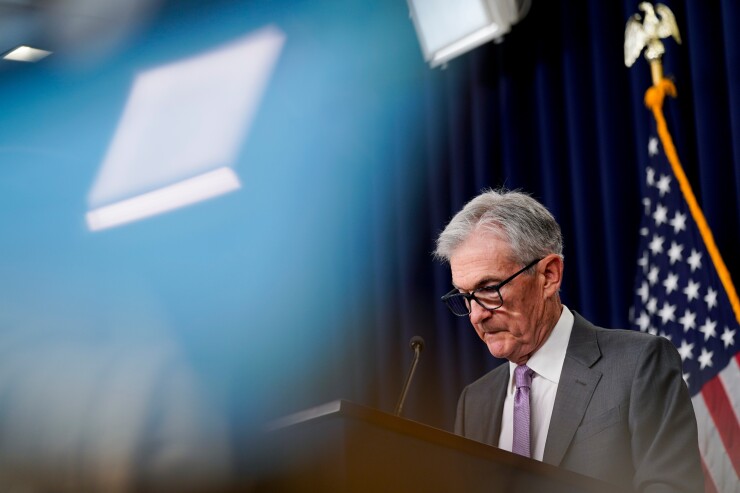
WASHINGTON —
Powell said the Fed continues to
"There's really nothing new going on at all," he said when asked about the controversial currency during his post Federal Open Market Committee press conference. "
Powell added that it is important for the Fed to study the technology — along with various other payments-focused innovations — given the significant role it plays in international transactions. He acknowledged that some major economies are working toward rolling out their own digital currencies, but noted that the U.S. is a long way from that point.
"No one here has decided that we think it's a good idea," Powell said.
Recent weeks have seen speculation that
The Fed's research of
During the press conference, Powell also reiterated that — despite broadsides from Republican presidential nominee Donald Trump — the Fed will remain staunchly apolitical in the lead-up to this fall's election.
"We're using our best thinking to understand the economy. We follow academics. We follow the many commentators who bless us with their commentary. But we don't change anything in our approach to address other factors, like the political calendar. Congress has, we believe, ordered us to conduct our business in a nonpolitical way — and not just some of the time," Powell said. "I'll say this too: We never use our tools to support or oppose a political party, a politician or any political outcome."
Earlier this month, former President Trump argued that a rate cut at this point in the year would amount to the Fed putting its finger on the scale in favor of the current administration.
During its meeting, the FOMC voted to hold the target range for its benchmark interest rate steady at between 5.25% and 5.5%, where it has been since last July. But Powell laid the groundwork for a cut at the Fed's next meeting on September 18.
"The broad sense of the committee is that the economy is moving closer to the point at which it will be appropriate to reduce our policy rate," Powell said. "In that, we will be data-dependent, but not data-point-dependent, so it will not be a question of responding specifically to one or two data points. The question will be whether the totality of the data — the evolving outlook and the balance of risks are consistent with rising confidence limitations and maintaining a solid labor market. If that test is met, the reduction in our policy rate could be on the table as soon as the next meeting."
The move to hold rates steady was broadly expected before the meeting. The prospect of a rate cut in September was also widely projected by market participants, in line with what Fed officials themselves have forecasted.
In its official statement, the committee noted that the two pillars of its monetary policy mandate — stable prices and full employment — "continue to move into better balance," meaning that the risk that elevated interest rates will weigh down the economy on more equal footing with the risk that high inflation will persist. Still, the FOMC remains "attentive to the risks to both sides."
During the press conference, Powell said the Fed has a chance to do something "historically unusual" by bringing inflation back down to its 2% target without major employment losses and does not want to fumble that opportunity.
"We're balancing the risk of going too soon against the risk of going too late — that's what we're doing," Powell said. "There's no guarantee in this. It's a very difficult judgment call, but this is how we're making it."
All eyes now turn to Jackson Hole, Wyo., where the Federal Reserve Bank of Kansas City will host its annual symposium next month. The Fed chair's keynote speech at the event has been a hotly anticipated checkpoint during the central bank's yearslong battle against high inflation.






